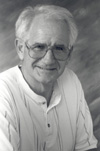MUSC-USC form center to study heart disease
With South Carolina leading the nation in rates of cardiovascular disease, the state's two medical schools have joined forces to establish a center to promote the study of cardiovascular disease in the state. The project was made possible by the awarding of an $11.3 million grant by the U.S. Department of Health and Human Services to MUSC and the University of South Carolina (USC).The grant establishes the South Carolina COBRE (Center for Biomedical Research Excellence) for Cardiovascular Disease.
While cardiovascular disease is the leading cause of illness and death in the United States, the burden of cardiovascular disease in South Carolina in terms of both morbidity and mortality exceeds the national average. The state has the third highest age-adjusted death rate for total cardiovascular diseases and is number one for deaths due to stroke, according to the American Heart Association’s 2001 Heart and Stroke Statistical Update.
In addition, African Americans in South Carolina exhibit disproportionately higher rates of mortality and complications from cardiovascular disease as well as a higher incidence of cardiovascular involvement in conjunction with chronic diseases such as diabetes. Epidemiologic studies indicate that even relocating to South Carolina can decrease life expectancy on average by two or more years due to cardiovascular-related diseases.
The presidents of both MUSC and USC have announced the formation of the South Carolina Cardiovascular Research Consortium. The consortium will implement and support the COBRE grant and promote further joint research endeavors between MUSC and USC.
Dr.
Roger Markwald
“Under the five-year grant, we will be able to develop a multidisciplinary and interactive center to promote cell and molecular understanding of the common pathways that lead to cardiovascular disease,” said Roger Markwald, Ph.D., professor and chairman of cell biology and anatomy at MUSC and principal investigator for the project. “It will be achieved by supporting investigators from several different disciplines and enhancing their research competitiveness.
“Individually, both institutions have research strengths in the area of cardiovascular biology, but lack the critical mass to establish a true national and international level of recognition and funding,” said Markwald. “Working together, we will be able to present a unified institutional image to the external peer review process and granting agencies.”
 Dr.
Thomas Borg
Dr.
Thomas Borg
Co-director on the COBRE project is Thomas Borg, Ph.D., professor and chairman of the Department of Developmental Biology and Anatomy at USC. “This effort will benefit the people of South Carolina not only because the two institutions are combining strengths and sharing resources, but also because the research will improve the understanding and treatment of cardiovascular disease,” Borg said.
The cooperation will enhance the research infrastructure by providing access to critical technologies through enhancing existing scientific core resources. In a relatively small state like South Carolina the adoption of new technology in a manner that fosters resource-sharing avoids redundancies and leverages limited state and institutional resources for biomedical research.
A key element of the project will be the mentoring of an initial group of five targeted, early career investigators to develop successful, independent, NIH-funded research careers in cardiovascular science. Their academic appointments are in five academic departments, four at MUSC and one at USC, ensuring a higher probability of developing a truly multidisciplinary center extending across both medical campuses.
“This project is right in line with the stated goals of the presidents and trustees of all three South Carolina research universities to form alliances in areas of mutual interest and complementary expertise,” said MUSC President Ray Greenberg, M.D., Ph.D. “I am particularly pleased that the proposal focuses on an area of direct relevance to the citizens of our state and region. Markwald and Borg and their colleagues are leading the way through this important scientific collaboration.”
Larry Faulkner, M.D., dean of the USC School of Medicine added, “Over
the years, the USC School of Medicine and MUSC have made a concerted effort
to collaborate on projects that benefit the people of South Carolina. The
Deans’ Rural Primary Care Clerkship for medical students at both schools
is a good example of this collaboration. But it is also important for us
to establish links in research. This grant demonstrates that researchers
at USC and MUSC can collaborate successfully to bring a research program
to fruition in an area of significant need in South Carolina. It can be
a blueprint for other collaborations among researchers.”